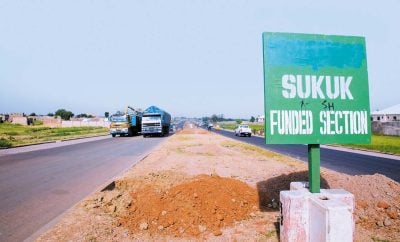
What is your take on Nigeria’s fiscal risks and how government can address them?
Fiscal risks are a major concern in Nigeria. Variation in budget implementation is one such fiscal risk. There is also the hidden debt. By hidden debt, I mean, the debts that are not disclosed, which the government does not usually report in the debt statements – such as the inter-agency institutional debts. Inter-agency debts are monies involving contractors, and those are all debts that are not reflected in the actual government budget.
We also have the forecast risk, where the government makes predictions, for instance on the exchange rate, which do not really reflect the reality.
With the devaluation of the naira, government has to generate more naira to be able to pay for external debts. But at the time of the budget formulation, perhaps you might have budgeted for some amount that is far less than what currently exists in the exchange rate market.So, all those volatilities are highlighted for the attention of the government.
Above all, over the last two years we have experienced poor growth but the outlook is actually as gloomy as we think. The cost of living crisis is increasing. So most likely, we will have an increase in costs as a result of some of the policies and reforms. So, all those are fiscal matters that will probably make the budget deviate from the time of the forecast.
Businesses in Nigeria are already beginning to suffocate, after energy, currency and so many other reforms happening at the same time. Do you see hope in these initiatives?
I really sympathise with Nigerians, but these are all issues that we have been raising over a very long time. We have underlying issues that should have been addressed much earlier, but the symptoms have been showing over the years. Unfortunately, we were not courageous enough to address all of them.
I think this new government came and found it necessary to address those anomalies in our economy. It is like a sick person that goes to a medical doctor for treatment. The person might have to put himself through some additional pains before the sickness goes.
So, in our context, one can look at it from a building perspective. When you have a building that has a good foundation, there might be an earthquake or something else that causes the building to shake. But as long as it has a good foundation, the likelihood of that building remaining strong will be there.
Where the building foundation is weak, the building will suffer, if not collapse, or there will be serious damage. So, that’s exactly what happened in our own context.
There were several fundamental issues with our economy that should have been addressed much earlier. And I think the commitment of the government was part of the issue or part of the reason why we have been dancing around certain things instead of addressing the fundamentals.
That’s why for a very long time, issues like subsidies have been raging. I remember in the last 10 years, we have all been talking about that. We haven’t seen any courage to address such areas from the government side.
But now a new regime has come and thankfully it has set out to really tackle the issue – not only subsidies but also the exchange rate and so many other economic matters that should have been addressed.
But I think there is still some room for improvement. Though the government is trying to make an effort to increase tax revenue, which is the fundamental problem with our economy, we still have a long way to go in terms of mobilising the actual tax take that Nigeria should have.
Once we address the issue of tax, I believe that more than half of our problems in terms of debt issues and public expenditure will be addressed.
Should we be discussing taxes for an economy where businesses are collapsing over high lending rates, inflation and cost of operations?
There are a lot of opportunities for us to tax. There are several principal areas the government needs to really look into.
Number one is property tax. The ratio of property tax to GDP in Nigeria is hardly 1% despite all the wealth that we have. This is compared to an average of about 5% to 10% in other lower-middle-income countries like ours.
That is one source that we can look at. Just consider the capital cities of any of our states and look at the number of buildings there are and ask how many landlords are actually paying tax to the government.
If you take that ratio into account, you realise that very few pay. We need to have a register that identifies who the owners of properties are and have a reporting format that can easily be tracked. If you use your house for rent, it is a source of income and you should declare it and pay a certain percentage – but that has not been happening.
That is why people are complaining. The problem is that the civil servants, all employees in the formal sector, are the ones taxed by the government but those who are in the informal sector, and those who have properties, who are millionaires are actually evading the tax that they were supposed to pay.
What are the hurdles around tax digitisation and how do you think they should be resolved?
We have actually tried to digitise the tax collection process, but there is room for improvement. In the collection process, checks and balances should also be improved.
For instance, if one is to pay a certain amount of money through an online format or to the federal revenue authorities, in many cases you will find when you go to pay the tax that the website does not work, but if you walk there physically, to the Internal Revenue Department, you will find that somehow it will work.
So, in my view, there has to be some form of monitoring mechanism that helps staff to check to see that all these processes are working, so that investors and those who are willing to pay online should have easy access.
At the ports, the authorities still go on physical inspections despite all the technology that we have. Actually, how many scanners are working in our ports? And that gives room for tax evasion because I don’t think there are sufficient customs staff to go through every container. But with digitisation and the right tools, the process will be seamless.
On enhanced tax collection such as property tax, there may be pushback from citizens who are responsible for building their own roads and providing their own power. Also, who would collect property tax, the state or the federal government?
Well, you’re absolutely correct that those are services that the government needs to be providing in terms of infrastructure to its citizens. However, the government is making efforts and what we need as a government is to build public confidence. So, once you build that confidence, and
the government start providing infrastructure, people will volunteer to come and pay.
So, both sides have obligations; the citizens have the obligation to pay the tax and the government also has an obligation to show you the dividend on what you are paying. Providing roads, for example, would be a beginning of an improvement in the arrangement of taxes and in terms of utilisation of the tax. n
Want to continue reading? Subscribe today.
You've read all your free articles for this month! Subscribe now to enjoy full access to our content.
Digital Monthly
£8.00 / month
Receive full unlimited access to our articles, opinions, podcasts and more.
Digital Yearly
£70.00 / year
Our best value offer - save £26 and gain access to all of our digital content for an entire year!
 Sign in with Google
Sign in with Google 



